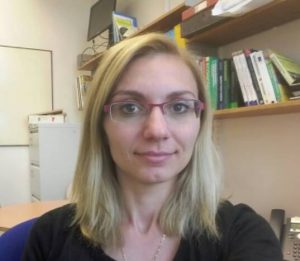May 31, 2018, by Simon Langley-Evans
Spotlight on Christie Siettou- Assistant Professor in Agriculture

In the latest of our profiles of career pathways of colleagues in the School of Biosciences, Dr Christie Siettou, Assistant Professor in Agriculture, speaks about her academic development and the challenges that she has hurdled on her way to her role in the School.
What was your career pathway leading to your current role?
One of the first seminars I attended as an undergrad in Greece was about ‘The determinants of having a successful career’ and as I sat in the lecture theatre I heard a panel of three men say that the factors that hinder career prospects are: being female (√), coming from a one parent family (√ – my dad passed away when I was young), coming from a low income family ( √ – mom’s salary three kids), and belonging to a minority (the only factor unchecked but I did think to myself…oh my goodness…I’m left-handed!). At that point I decided that I needed to further my qualifications. I sought to do a masters in my field of interest (Agri-Environmental Economics). At that time Greece didn’t offer such a course so I had to go abroad. I decided the UK was the best place to study. While studying for my masters, I developed a particular interest in Animal Welfare. I was told that it would be too big of a topic to tackle as a masters’ dissertation and that I should think about doing a PhD on it. I remember, I timidly knocked on Prof. Rob Fraser’s office door to ask if he would supervise me and he enthusiastically asked ‘When do you want to start?’! During my PhD, I worked as a Graduate Teaching Assistant and I thoroughly enjoyed teaching. I also had the opportunity to be the module convenor of an economics module gaining experience on curriculum development and on actually leading a module. Immediately after completing my PhD I got a Fellowship at Defra as an Animal Health Economist and while working there I saw the advertisement for this Assistant Professor position. I started working here the day after I completed my fellowship.
What challenges did you encounter along the way?
The first challenge was the financial one. In order to be able to study for a masters I had to first have the funds for it! So whilst completing my final undergraduate year I worked three jobs (one full-time and two part-time jobs). The financial challenge rose again when I decided to undertake a PhD, I had applied for a Doctoral Scholarship (which included a maintenance grant) had that not been successful – I wouldn’t have undertaken the PhD. And again, I was up against the financial challenge during my fellowship as I was paid in milestones (but try telling that to the estate agency!). The other challenge was living a nomad life in a foreign country. In the nine years that I have been living here, I have changed seven addresses! I literally lived out of a suitcase (easy to transport and cheaper removal costs too!).
How did you overcome those challenges?
Both challenges were overcome by the same solutions: good planning and supportive family and friends. As mentioned I planned ahead for every step. The only hiccup was the fellowship as I didn’t realize how far away the first milestone would be! Thankfully, I had economized while doing my PhD and had some money saved that lasted me a few months. Once money got tight (and train services were too expensive so had to commute daily by bus in and out of London) friends and family were the heroes of the day! My mom offered to pay a couple of months’ rent and a friend that lives in London took me in so I wouldn’t need to commute for a while. Finally payday came. Also, living as a nomad isn’t easy but thankfully, I have established good friendships that offer much appreciated help when needed.
Have there been any specific people or actions that you have found supportive in developing your career?
First and foremost, Prof. Rob Fraser. While standing in front of his door I had told myself that if he declined in supervising my PhD I wouldn’t pursue it further. I didn’t really have my heart set on doing a PhD – it was more of a ‘why not?’ opportunity. And again, it was Rob who forwarded me the ad of the Defra Fellowship thinking I was suitable for this position and that I should apply for it. Despite the financial challenge that was tied with the fellowship, this opportunity really enhanced my skills and understanding of UK agriculture economics and policy which I think may have been instrumental in my securing my current post. Secondly, my colleagues here as not only I learn from them every day but they also have the confidence in me to take up tasks and duties.
If you could give advice to your younger self, what would you say about developing your career?
I would advise her to take up foreign languages, they are sure to come in handy and open more opportunities for you in the future. Your older self would have thanked you for putting the effort because she dreads putting the effort now!
No comments yet, fill out a comment to be the first

Leave a Reply